Fleurs du Mal Magazine


Hinter der Zeitenwende von 1968 steckt mehr als nur eine politische Revolte: Männer ließen sich die Haare lang wachsen, Frauen wollten endlich die Pille nehmen dürfen, Drogen wurden konsumiert, Musikfestivals, Kommunen und neue Zeitschriften stellten das vorhandene Weltbild auf den Kopf.
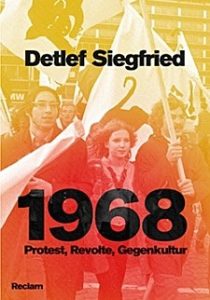 So unterschiedliche Heldenfiguren wie Twiggy, Rudi Dutschke, Che Guevara, Jimi Hendrix und Mao Tse-Tung traten auf den Plan, während die deutsche Politik noch mit dem Vermächtnis der NS-Zeit zu kämpfen hatte.
So unterschiedliche Heldenfiguren wie Twiggy, Rudi Dutschke, Che Guevara, Jimi Hendrix und Mao Tse-Tung traten auf den Plan, während die deutsche Politik noch mit dem Vermächtnis der NS-Zeit zu kämpfen hatte.
Es wäre jedoch ein Irrtum zu glauben, alles habe erst 1968 begonnen. Detlef Siegfried zeigt, welche gesellschaftlichen Veränderungen und politischen Ereignisse schon im Vorfeld nötig waren, damit die Revolte der Schüler, Studenten und Lehrlinge Fahrt aufnehmen konnte. Dabei lässt er nicht nur die Gegenkultur in Großstädten wie Berlin oder Frankfurt am Main wieder aufleben, sondern rückt auch Schauplätze aus der bundesrepublikanischen Provinz ins Rampenlicht. Doch wie viel revolutionäre Dynamik ließ sich in die »roten« Siebzigerjahre hinüberretten? Und was wurde eigentlich aus all den Linken?
Detlef Siegfried, geb. 1958, ist Professor für neuere deutsche und europäische Geschichte an der Universität Kopenhagen. Er hat mehrere Bücher zu Alltagskultur, Pop und Linksradikalismus in der Bundesrepublik veröffentlicht, darunter Time is on my side. Konsum und Politik in der westdeutschen Jugendkultur der 60er Jahre (2006) und Sound der Revolte. Studien zur Kulturrevolution um 1968 (2008).
Siegfried, Detlef:
1968
Protest, Revolte, Gegenkultur
Originalausgabe Reclam
Geb. Format: 16 x 24 cm
299 Seiten
60 farb. Abb.
ISBN: 978-3-15-011149-9
€ 28,00
new books
fleursdumal.nl magazine
More in: - Book News, - Book Stories, Archive S-T, Art & Literature News, Protests of MAY 1968
Iemand belt aan.
`Willen jullie touw?’
Mels herkent de zigeuner die soms in het dorp komt venten. Hij heeft een karretje met rollen touw.
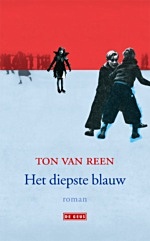 `Echt goed henneptouw.’
`Echt goed henneptouw.’
`Wij gebruiken geen touw.’
Dan pas ziet hij de jongen die naast het karretje staat. Een smalle jongen, met een bleke huid.
`Hebben jullie feest?’ vraagt de man.
`Nee’, zegt Mels verbaasd.
`Wij spelen op feesten. Jacob speelt heel goed.’ De man knikt in de richting van de jongen. `Mijn zoon heeft talent. Jacob, laat iets horen.’
Jacob pakt een viool uit een kist en speelt de muziek van het lied `Daar waren eens twee koningskinderen en ze hadden elkander zo lief’. Mels zingt het liedje in zijn hoofd mee.
Een paar deuren gaan open. Mensen luisteren.
`Zo is het genoeg’, zegt Jacob na het spelen van het lied. Hij stopt de viool terug in de kist.
Mels sluit de deur.
`Wie was daar?’ roept zijn moeder uit het achterhuis.
`Twee koningskinderen’, zegt Mels.
`Ik dacht dat ik muziek hoorde.’
`Hoorde je ook. Zigeuners op straat.’
`Heb je ze een dubbeltje gegeven?’
`Had ik niet. Volgende keer.’
`Was het die jongen?’
`Ja, Jacob.’
`Die schopt het nog ver. Ik weet zeker dat hij ooit voor de koningin zal spelen.’
`Weet je ook zeker of hij dat wil?’
`Waarom niet?’
`Ik denk het niet.’
`Waarom?’
`Daarom.’
Ton van Reen: Het diepste blauw (041)
wordt vervolgd
fleursdumal.nl magazine
More in: - Book Stories, - Het diepste blauw, Archive Q-R, Reen, Ton van
Set in Cuba’s Sierra Maestra in the 1950s, in the days leading up to the Revolution–Manchette’s unfinished masterpiece with a fearless female protagonist.
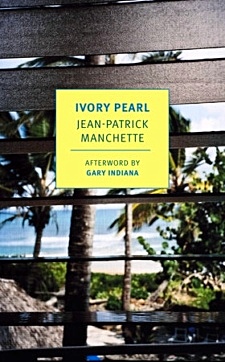 Out of the wreckage of World War II swaggers Ivory Pearl, so named (rhymes with girl) by some British soldiers who made her their mascot, a mere kid, orphaned, survivor of God knows what, but fluent in French, English, smoking, and drinking. In Berlin, Ivy meets Samuel Farakhan, a rich closeted intelligence officer. Farakhan proposes to adopt her and help her to become the photographer she wants to be; his relationship to her will provide a certain cover for him. And she is an asset. The deal is struck…
Out of the wreckage of World War II swaggers Ivory Pearl, so named (rhymes with girl) by some British soldiers who made her their mascot, a mere kid, orphaned, survivor of God knows what, but fluent in French, English, smoking, and drinking. In Berlin, Ivy meets Samuel Farakhan, a rich closeted intelligence officer. Farakhan proposes to adopt her and help her to become the photographer she wants to be; his relationship to her will provide a certain cover for him. And she is an asset. The deal is struck…
1956: Ivy has seen every conflict the postwar world has on offer, from Vietnam to East Berlin, and has published her photographs in slick periodicals, but she is sick to death of death and bored with life and love. It’s time for a break. Ivy heads to Cuba, the Sierra Maestra.
History, however, doesn’t take vacations.
Ivory Pearl was Jean-Patrick Manchette’s last book, representing a new turn in his writing. It was to be the first of a series of ambitious historical thrillers about the “wrong times” we live in. Though left unfinished when Manchette died, the book, whose full plot has been filled in here from the author’s notes, is a masterpiece of bold suspense and black comedy: chilling, caustic, and perfectly choreographed.
Jean-Patrick Manchette (1942–1995) was a genre-redefining French crime novelist, screenwriter, critic, and translator. Born in Marseille to a family of relatively modest means, Manchette grew up in a southwestern suburb of Paris, where he wrote from an early age. While a student of English literature at the Sorbonne, he contributed articles to the newspaper La Voie communiste and became active in the national students’ union.
In 1961 he married, and with his wife Mélissa began translating American crime fiction—he would go on to translate the works of such writers as Donald Westlake, Ross Thomas, and Margaret Millar, often for Gallimard’s Série noire. Throughout the 1960s Manchette supported himself with various jobs writing television scripts, screenplays, young-adult books, and film novelizations. In 1971 he published his first novel, a collaboration with Jean-Pierre Bastid, and embarked on his literary career in earnest, producing ten subsequent works over the course of the next two decades and establishing a new genre of French novel, the néo-polar (distinguished from traditional detective novel, or polar, by its political engagement and social radicalism). During the 1980s, Manchette published celebrated translations of Alan Moore’s Watchmen graphic novels for a bande-dessinée publishing house co-founded by his son, Doug Headline. In addition to Fatale (also available as an NYRB Classic), Manchette’s novels Three to Kill and The Prone Gunman, as well as Jacques Tardi’s graphic-novel adaptations of them (titled West Coast Blues and Like a Sniper Lining Up His Shot, respectively), are available in English.
Ivory Pearl
by Jean-Patrick Manchette,
translated from the French by Donald Nicholson-Smith,
introduction by Doug Headline,
with an afterword by Gary Indiana
Paperback – $14.95
Published by NYRB
An NYRB Classics Original
Publication Date: May 1, 2018
208 Pages
ISBN 9781681372105
French Literature
Literary Fiction
new translations
fleursdumal.nl magazine
More in: - Book News, - Book Stories, Archive M-N, Thrillers, TRANSLATION ARCHIVE
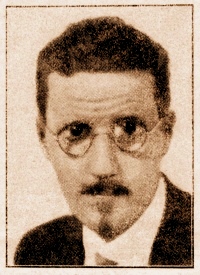
Alone
The noon’s greygolden meshes make
All night a veil,
The shorelamps in the sleeping lake
Laburnum tendrils trail.
The sly reeds whisper to the night
A name– her name-
And all my soul is a delight,
A swoon of shame.
James Joyce
(1882-1941)
Alone
fleursdumal.nl magazine
More in: Archive I-J, Archive I-J, Joyce, James, Joyce, James
” Tu es un petit ange de génie et de fidélité. ” Ainsi Céline parlait-il de sa femme, Lucette Almanzor, connue sous le nom de Madame Céline.
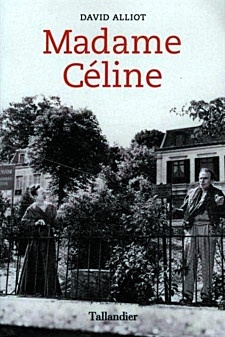 De leur rencontre en 1936 dans un studio de danse jusqu’à la mort de l’auteur de Voyage au bout de la nuit en 1961, la danseuse et l’écrivain ne se sont jamais quittés. Toute en grâce et en légèreté, elle a vingt ans de moins que lui. Célèbre, il l’aide pour sa carrière. Elle est dépensière, il est radin, elle est charmante, il est bourru, elle est élégante, il est mal habillé. En 1943, ils se marient, pour le meilleur parfois, comme pour le pire souvent.
De leur rencontre en 1936 dans un studio de danse jusqu’à la mort de l’auteur de Voyage au bout de la nuit en 1961, la danseuse et l’écrivain ne se sont jamais quittés. Toute en grâce et en légèreté, elle a vingt ans de moins que lui. Célèbre, il l’aide pour sa carrière. Elle est dépensière, il est radin, elle est charmante, il est bourru, elle est élégante, il est mal habillé. En 1943, ils se marient, pour le meilleur parfois, comme pour le pire souvent.
L’Occupation à Montmartre, la fuite à Sigmaringen, l’exil au Danemark, elle a tout supporté par amour et fidélité. Quand le couple rentre en France après six années d’exil, avec le chat Bébert, il s’installe dans un pavillon à Meudon où il ouvre un cabinet médical, tandis qu’elle donne des cours de danse.
Grâce à des archives inédites et des témoignages surprenants, David Alliot, spécialiste de Céline, perce le mystère de cette étrange alchimie qui unit ce couple pas tout à fait comme les autres. Gardienne de sa mémoire, elle veillera à la postérité de l’oeuvre de son mari.
Jusqu’à son dernier souffle, Madame Céline recevra chez elle le tout Paris des lettres, admiratif et nostalgique, qui l’écoute raconter ses incroyables souvenirs. Pour la première fois, l’extraordinaire destinée de cette femme aussi discrète que mystérieuse nous est dévoilée.
David Alliot: Spécialiste de Louis-Ferdinand Céline, David Alliot est l’auteur du remarqué D’un Céline l’autre, publié dans la collection « Bouquins » chez Robert Laffont.
David Alliot:
Madame Céline
Genre : Biographie
Parution : 18 janvier 2018
Prix: € 20,90
Nombre de pages : 432
EAN 979-1021020931
ISBN 1021020931
Éditions Tallandier Paris
Biographie Madame Céline
fleursdumal.nl magazine
More in: Archive C-D, Art & Literature News, Louis-Ferdinand Céline
Hij bladert door de mappen met foto’s. In tien mappen heeft hij de foto’s van de molen en de meelfabriek verzameld.
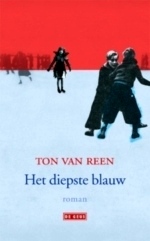 Ook foto’s van de mensen in het dorp, want iedereen werkte bij de fabriek. Een eeuw lang heeft de fabriek het leven in het dorp beheerst.
Ook foto’s van de mensen in het dorp, want iedereen werkte bij de fabriek. Een eeuw lang heeft de fabriek het leven in het dorp beheerst.
Elke dag werkt hij een paar uur aan de bijschriften. Het is een hels karwei om de namen op te sporen van vergeten mensen. Hoe verder terug in de tijd, hoe meer het lijkt of de mensen van dag tot dag hebben geleefd. Ze schreven weinig op. De boekhouding van de weduwe Hubben-Houba was niet meer dan een aantekenboekje. De tien werknemers hadden alleen voornamen. Hoe wist de weduwe het onderscheid tussen de drie Jannen en de twee Jozefs?
Vervelend is dat hij in zijn roes weer een map door elkaar gehusseld heeft. Te veel pillen geslikt voor verwijding van de bloedvaten, om meer bloed naar zijn hersenen te sturen. Het gevolg is dat hij alleen maar een vage herinnering aan de voorgaande dagen heeft. Dagen dat hij niet buiten is geweest. Niet eens beneden. Niet is aangekleed. Gelukkig hebben de medicijnen geholpen en is hij weer helder. Hij moet in zijn archief gezocht hebben naar foto’s die er niet zijn. Hij weet het nog vaag.
Soms is hij op zoek naar foto’s van Jacob.
Als hij helder is weet hij dat er geen foto’s van Jacob zijn.
Ton van Reen: Het diepste blauw (040)
wordt vervolgd
fleursdumal.nl magazine
More in: - Book Stories, - Het diepste blauw, Archive Q-R, Reen, Ton van
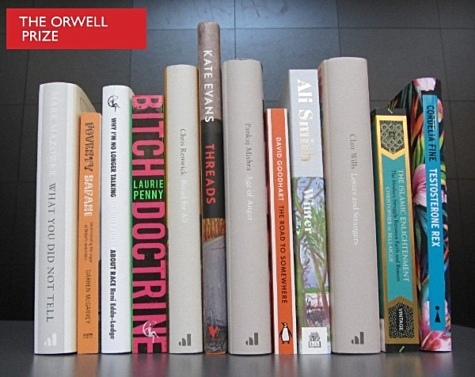
The longlist of The Orwell Prize for Books 2018 features historical writing, fiction and for the first time a graphic novel.
The Islamic Enlightenment: The Modern Struggle Between Faith and Reason, Christopher de Bellaigue (Bodley Head). An absorbing account of the political and social reformations that transformed the lands of Islam in the nineteenth and early twentieth centuries)
Why I’m No Longer Talking to White People about Race, Reni Eddo-Lodge (Bloomsbury). A book on racial inequalities, exploring issues from eradicated black history to the political purpose of white dominance, whitewashed feminism to the inextricable link between class and race
 Threads from the Refugee Crisis, Kate Evans (Verso). Combining the techniques of eyewitness reportage with the medium of comic-book storytelling, Evans has produced a compelling view into the life of asylum seekers living in Calais’s ‘Jungle’.
Threads from the Refugee Crisis, Kate Evans (Verso). Combining the techniques of eyewitness reportage with the medium of comic-book storytelling, Evans has produced a compelling view into the life of asylum seekers living in Calais’s ‘Jungle’.
Testosterone Rex, Cordelia Fine (Icon Books). A book explaining why past and present sex roles are only serving suggestions for the future. It reveals a much more dynamic situation through an entertaining and well-documented exploration of the latest research that draws on evolutionary science, psychology, neuroscience, endocrinology, and philosophy.
The Road to Somewhere – The Populist Revolt and the Future of Politics, David Goodhart (Hurst Publishers). An exposition of how the political elites have failed their societies. This investigation into the new global politics reveals how the Somewhere backlash is a democratic response to the dominance of Anywhere interests, in everything from mass higher education to mass immigration.
What You Did Not Tell, Mark Mazower (Allen Lane). In the centenary of the Russian Revolution, What You Did Not Tell recounts a brand of socialism erased from memory – humanistic, impassioned, and broad-ranging in its sympathies. But it also explores the unexpected happiness that may await history’s losers, the power of friendship, and the love of place.
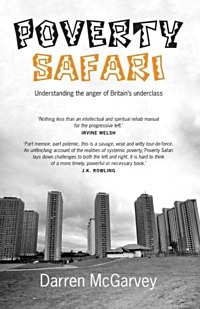 Poverty Safari, Darren McGarvey (Luath Press). People from deprived communities all across Britain feel misunderstood and unheard. Darren McGarvey, aka Loki, gives voice to their feelings and concerns, and anger that is spilling over.
Poverty Safari, Darren McGarvey (Luath Press). People from deprived communities all across Britain feel misunderstood and unheard. Darren McGarvey, aka Loki, gives voice to their feelings and concerns, and anger that is spilling over.
Age of Anger: A History of the Present, Pankaj Mishra (Allen Lane). How can we explain the origins of the great wave of paranoid hatreds that seem inescapable in our close-knit world – from American ‘shooters’ and ISIS to Trump? Pankaj Mishra answers our bewilderment by casting his gaze back to the eighteenth century, before leading us to the present.
Bitch Doctrine, Laurie Penny (Bloomsbury) Bread for All:The Origins of the Welfare State, Chris Renwick (Allen Lane). This collection of Laurie Penny’s writing covers everything from the shock of Donald Trump’s election and the victories of the far right, to online harassment and the transgender rights movement. These darkly humorous articles provoke challenging conversations about the definitive social issues of today.
Winter, Ali Smith (Hamish Hamilton). In the second novel in her Seasonal cycle, Smith’s shape-shifting quartet of novels casts a merry eye over a bleak post-truth era with a story rooted in history, memory and warmth, its taproot deep in the evergreens: art, love, laughter.
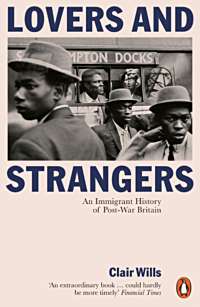 Lovers and Strangers: An Immigrant History of Post-War Britain, Clair Wills (Allen Lane). Clair Wills’ book brings to life the incredible diversity and strangeness of the migrant experience. She introduces us to lovers, scroungers, dancers, homeowners, teaches, drinkers, carers and many more to show the opportunities and excitement as much as the humiliation and poverty that could be part of the new arrivals’ experience.
Lovers and Strangers: An Immigrant History of Post-War Britain, Clair Wills (Allen Lane). Clair Wills’ book brings to life the incredible diversity and strangeness of the migrant experience. She introduces us to lovers, scroungers, dancers, homeowners, teaches, drinkers, carers and many more to show the opportunities and excitement as much as the humiliation and poverty that could be part of the new arrivals’ experience.
The judges for the Orwell Prize for Books are politician, academic and journalist Andrew Adonis (Chair), Literary Journalist and Artistic Director of Words and Literature of the Bath Festival, Alex Clark, author Kit de Waal, and Lorien Kite, Deputy Life & Arts Editor for the Financial Times.
The shortlist for The Orwell Prize for Books will be announced at The Bath Festival on 18th May. The winner of the £3000 prize will be unveiled on 25th June 2018 at The RSA, together with the winner of The Orwell Prize for Journalismand The Orwell Prize for Exposing Britain’s Social Evils.
Previous winners of the Orwell Prize for Books include John Bew for his biography of Clement Attlee (2017), Raja Shehadeh (2008), Alan Johnson (2014), and Andrea GiThe judges for the Orwell Prize for Booksllies (2010).
The Orwell Prize 2018 is for work published in the calendar year 2018. For more details and rules of entry please visit www.orwellfoundation.com
orwell-prize 2018
fleursdumal.nl magazine
More in: - Book Lovers, - Book News, Art & Literature News, Awards & Prizes, George Orwell, PRESS & PUBLISHING

Helas
To drift with every passion till my soul
Is a stringed lute on which all winds can play,
Is it for this that I have given away
Mine ancient wisdom, and austere control?
Methinks my life is a twice-written scroll
Scrawled over on some boyish holiday
With idle songs for pipe and virelay,
Which do but mar the secret of the whole.
Surely there was a time I might have trod
The sunlit heights, and from life’s dissonance
Struck one clear chord to reach the ears of God.
Is that time dead? lo! with a little rod
I did but touch the honey of romance
And must I lose a soul’s inheritance?
Oscar Wilde
(1854 – 1900)
Helas
fleursdumal.nl magazine
More in: Archive W-X, Wilde, Oscar, Wilde, Oscar
Al vroeg in de ochtend vertrekt zijn vader in de zwarte Ford naar de boeren, om graan in te kopen voor de meelfabriek.
 Zijn werk kost zweet, bloed en tranen. Directeur Frits schrijft zijn vader voor hoeveel hij uit mag geven en daar mag hij geen cent bovenop doen.
Zijn werk kost zweet, bloed en tranen. Directeur Frits schrijft zijn vader voor hoeveel hij uit mag geven en daar mag hij geen cent bovenop doen.
`Onderhandelen met boeren over een prijs is bijna onmogelijk’, zegt vader. `Ze willen het onderste uit de kan. De room is voor de boeren en toch voelen ze zich altijd bestolen.’
Wat vader over de boeren vertelt, is precies het tegenovergestelde van wat grootvader Bernhard erover vertelt. Die zegt altijd dat de boeren te weinig krijgen.
Vader zwerft door het hele land. Bijna elke week brengt hij handdoeken mee waarop de namen van de hotels zijn geborduurd. Moeder is daar kwaad over, omdat hij ze pikt, maar hij zegt dat hij erom vraagt en ze krijgt als souvenirs. Ze hebben er een kast vol van, maar moeder gebruikt ze nooit.
Vader is alleen op zondag thuis, maar ook dan heeft hij geen tijd voor Mels. Dan gaat hij naar de hoogmis en daarna kaarten in het café. Daar is dan ook de jonge directeur Frans-Joseph, die een kwade dronk heeft. In het café gaat hij net zo tekeer tegen zijn kaartvrienden als door de week tegen de arbeiders. Niemand durft tegen hem te zeggen dat ze liever zonder hem kaarten. Zeker Mels’ vader niet.
`Rot maar op’, hoeft Frans-Joseph maar te zeggen. `Rot jij maar op.’ Zoals hij dat soms tegen mensen zegt als hun gezicht hem niet aanstaat of hun werk hem niet bevalt. Ze moeten altijd oppassen voor de directeuren.
Het kaarten eindigt meestal met ruzie. Vaak gaat Frans-Joseph met herrie naar huis. Als vader na zo’n kaartpartij thuiskomt, zegt hij geen stom woord en heeft hij hoofdpijn.
Soms zoekt Mels zijn vader op in het café. Dan krijgt hij limonade. Maar daar is het hem niet om te doen. Hij wil hem alleen maar vragen om naar huis te komen, omdat moeder op hem zit te wachten. Vader blijft altijd net zo lang in het café als de directeur en vaak is dat tot aan het avondeten.
Slechts op een enkele zondag, als Frans-Joseph op reis is of gewoon op vakantie, gaan ze met het gezin een stukje rijden. Na het middagdutje van vader. Nooit ver. Vader rijdt niet graag op zondag. Mels vindt die korte ritjes niet erg. Later haalt hij de schade wel in. Dan koopt hij zelf een Ford of een Borgward Isabella. Net zo’n grote zwarte bak als directeur Frits heeft.
Ton van Reen: Het diepste blauw (039)
wordt vervolgd
fleursdumal.nl magazine
More in: - Book Stories, - Het diepste blauw, Archive Q-R, Reen, Ton van
De Provincie West-Vlaanderen herdenkt van 2014 tot en met 2018 op culturele wijze 100 jaar Groote Oorlog. Deze eigentijdse, toekomstgerichte en multidisciplinaire herdenking kreeg de naam ‘GoneWest’.
GoneWest verbindt talloze levensverhalen met gedegen historisch besef en ontsluit deze kleine en grote verhalen via muziek-, dans-, theaterevenementen, literatuur en beeldende kunst.
“…because his brother had gone west, raved at the bleeding war; his rampant grief moaned, shouted, sobbed, and choked, while he was kneeling half-naked on the floor. In my belief such men have lost all patriotic feeling.” Siegfried Sassoon
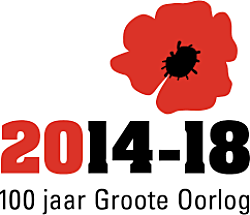 ‘To go west’, een Engelse uitdrukking, die zoveel betekent als sterven, kreeg tijdens de Eerste Wereldoorlog een bijkomende betekenis mee. Het ten westen gaan van de doden, met de ondergaande zon mee, werd aan het geallieerde front meer dan zomaar een metafoor. Britten, Fransen en Belgen bezetten dan ook het westelijke deel van dat Westelijke Front, dat van het noorden naar het zuiden West-Vlaanderen en Noord-Frankrijk doorsneed. Hun gesneuvelden en gekwetsten brachten ze daarmee letterlijk naar het westen toe.
‘To go west’, een Engelse uitdrukking, die zoveel betekent als sterven, kreeg tijdens de Eerste Wereldoorlog een bijkomende betekenis mee. Het ten westen gaan van de doden, met de ondergaande zon mee, werd aan het geallieerde front meer dan zomaar een metafoor. Britten, Fransen en Belgen bezetten dan ook het westelijke deel van dat Westelijke Front, dat van het noorden naar het zuiden West-Vlaanderen en Noord-Frankrijk doorsneed. Hun gesneuvelden en gekwetsten brachten ze daarmee letterlijk naar het westen toe.
Expo 600.000 beeldjes – 600.000 namen
Ervaar vanaf april 2018 de indrukwekkende land-artinstallatie ComingWorldRememberMe in het provinciedomein De Palingbeek in Ieper.
Deze installatie strekt zich uit over het niemandsland en The Bluff, een van de zwaarst bevochten plekken van de Eerste Wereldoorlog. De 600.000 beeldjes krijgen een plaats tussen drie grote kunstwerken van kunstenaar Koen Vanmechelen.
Tienduizenden mensen uit Vlaanderen en de rest van de wereld hielpen ComingWordRememberMe tot stand komen: samen maakten ze 600.000 beeldjes. Bij elk beeldje hoort een dog tag, het universele identificatiesysteem voor frontsoldaten. De dog tags combineren telkens de naam van een WOI-slachtoffer met de naam van een maker van een beeldje. Elke dog tag verbindt zo letterlijk het verleden met het heden.
Een doorzichtig werk van kunstenaar Koen Vanmechelen biedt plaats aan de 600.000 dog tags. De namen van de oorlogsslachtoffers komen uit ‘De Namenlijst’. Het In Flanders Fields Museum in Ieper stelde deze digitale lijst met alle slachtoffers van WOI in België samen.
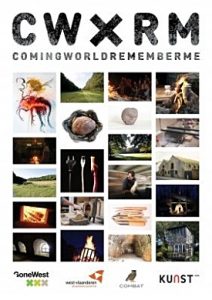
Het doorzichtige kunstwerk met de 600.000 dog tags krijgt een plaats in het paviljoen aan de start van het wandelparcours rond de land-artinstallatie. Het verenigt er letterlijk de verschillende nationaliteiten en generaties in de herdenking. Het engagement van al de betrokken mensen maakt van de land-art-installatie een grens- en generatie-overschrijdend symbool van vrede.
Tot eind mei 2018 kunt u bij uw bezoek aan het paviljoen een wandeling starten. Langs een deel van het wandeltraject hoort u op verschillende rustpunten oorlogspoëzie. De wandeling eindigt op de uitkijkbrug met een bijzonder uitzicht over de indrukwekkende land-artinstallatie.
Door het karakter van de locatie kan de volledige land-artinstallatie maar tijdelijk in het provinciaal domein De Palingbeek blijven staan. De dog-tags met de namen van oorlogsslachtoffers en peters en meters krijgen wel een definitieve plaats op het Niemandsland.
De organisatoren streven ernaar om de beeldjes na afloop van de expo op een respectvolle manier te verwijderen. Eind 2018 krijgen eerst alle peters en meters de kans om een beeldje uit de installatie op te halen. Voor de resterende beeldjes zoeken de initiatiefnemers een museale bestemming op verschillende locaties, zowel in België als in het buitenland.

Expo 600.000 beeldjes – 600.000 namen
Tot eind mei 2018
Koen Vanmechelen
Het oeuvre van kunstenaar Koen Vanmechelen is een voortdurende zoektocht naar de universele waarheid van ons bestaan. Met projecten als ‘The Cosmopolitan Chicken Project’, ‘The Open University of Diversity’ en ‘The Accident’, exploreert Koen Vanmechelen de terreinen van diversiteit en identiteit. Hij wordt hiervoor naar inhoud en verbeelding sinds jaren internationaal gerespecteerd. Het werk van Vanmechelen is een ode aan het leven en is bestemd voor de nieuwe kosmopolitische mens. Hij koestert culturele verschillen. Is ruimdenkend. Zoekt naar begrip van het andere. Leeft van constructieve confrontatie. Verlegt grenzen. Is uit op symbiose. Probeert de beladen begrippen ‘identiteit’ en ‘diversiteit’ te herdefiniëren in een wereld die ooit grenzeloos was en het ooit weer zal worden.Een filosofie die perfect aansluit bij het verhaal dat ComingWorldRememberMe wil vertellen dus.
Meer informatie op website: http://www.koenvanmechelen.be & https://www.gonewest.be/
GONEWEST: Artistieke herdenking 100 jaar Groote Oorlog in West-Vlaanderen
fleursdumal.nl magazine
More in: *War Poetry Archive, Art & Literature News, FDM Art Gallery, Galerie des Morts, Historia Belgica, Land Art, WAR & PEACE

Pierre-Jean de Béranger
La bacchante
Cher amant, je cède à tes désirs ;
De champagne enivre Julie.
Inventons, s’il se peut, des plaisirs
Des amours épuisons la folie.
Verse-moi ce joyeux poison ;
Mais surtout bois à ta maîtresse :
Je rougirais de mon ivresse
Si tu conservais ta raison.
Vois déjà briller dans mes regards
Tout le feu dont mon sang bouillonne.
Sur ton lit, de mes cheveux épars,
Fleur à fleur vois tomber ma couronne.
Le cristal vient de se briser :
Dieu ! baise ma gorge brûlante,
Et taris l’écume enivrante
Dont tu le plais à l’arroser.
Verse encore ; mais pourquoi ces atours
Entre tes baisers et mes charmes ?
Romps ces nœuds, oui, romps-les pour toujours,
Ma pudeur ne connaît plus d’alarmes.
Presse en tes bras mes charmes nus.
Ah ! je sens redoubler mon être !
A l’ardeur qu’en moi tu fais naître,
Ton ardeur ne suffira plus.
Dans mes bras tombe enfin à ton tour ;
Mais, hélas ! tes baisers languissent.
Ne bois plus, et garde à mon amour
Ce nectar où tes feux s’amortissent.
De mes désirs mal apaisés,
Ingrat, si tu pouvais te plaindre,
J’aurai du moins pour les éteindre
Le vin où je les ai puisés.
Pierre-Jean de Béranger (1780-1857)
La bacchante
Toutes les chansons de Béranger (1843)
fleursdumal.nl magazine
More in: Archive A-B, Béranger, Pierre-Jean de
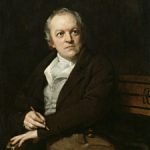
The Angel poetry
I Dreamt a Dream! what can it mean?
And that I was a maiden Queen:
Guarded by an Angel mild;
Witless woe, was neer beguil’d!
And I wept both night and day
And he wip’d my tears away
And I wept both day and night
And hid from him my hearts delight
So he took his wings and fled:
Then the morn blush’d rosy red:
I dried my tears & armd my fears,
With ten thousand shields and spears.
Soon my Angel came again;
I was arm’d, he came in vain:
For the time of youth was fled
And grey hairs were on my head
William Blake (1757 – 1827)
Poem: The Angel poem
fleursdumal.nl magazine
More in: Archive A-B, Blake, William
Thank you for reading Fleurs du Mal - magazine for art & literature